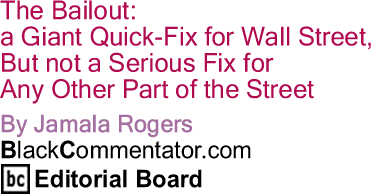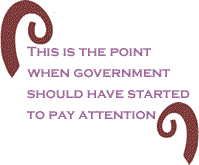
|
|||||||||||||||||||||||

|
|

Custom Search
|
|
 |
|
The
U.S government’s $700 billion to possibly $1 trillion bailout for
Wall Street banks and investment companies did not even
buy a sense of temporary confidence in
global markets - at
least in the short run, judging by the continual wide fluctuations
in the U.S., and now, world stock markets. It is quite possible that the bailout
will emerge as one of the biggest financial mistakes made by the
The
idea underlying the bailout is
that banks and other financial institutions
could be relieved billions
of dollars of bad loans and risky financial packages in return for
some degree of
The
financial crisis and bailout has generated a debate between conservatives
and more liberal-leaning elected officials in the Liberals are in general agreement that a de-regulatory framework is the culprit. Beginning with the Reagan presidency, financial institutions were allowed more flexibility and less oversight by government and regulators.
Another story has been missing in these debates and in the overall discourse about the cause of the crisis, and what might be appropriate and strategic responses. Overlooked in the design of the bailout plan is the fact that the financial crisis was in the making when stories about the market exploitation of low-income and working-class communities, mostly communities of color, were starting to appear in the media. This is the point when government should have started to pay attention. In 2003 and 2004 foreclosures in low-income neighborhoods started to explode in numbers and rapidity throughout the country. Foreclosure patterns in many urban communities of color exhibited patterns of “spatial concentrations”, where entire blocks and sub-neighborhoods experienced rapid increases in the number of foreclosure petitions. It was clear to some observers on the ground that certain communities, many with a high proportion of low-income families, were being targeted for predatory lending practices or as places where sub-prime mortgages could be exacted. Community activists like Ana Luna in the city of Lawrence, Massachusetts - one of the poorest cities in the New England region - held many community meetings three and four years ago (!) to try to awaken the general public’s knowledge of how low-income communities were being utilized via housing to subsidize growing and vast profits for financial institutions. Along with other activists, she encouraged the Lawrence City Council to adopt a “foreclosure watch zone” for one of the poorest neighborhoods in this city, but where homeownership via sub-prime loans was taking place at a rapid and explosive rate. The immediate purpose of this city council resolution was simply to tell the rest of the state that we have a big problem on our hands. These
spatial concentrations of foreclosures in places like If
government, the private sector, and the general
public had earlier treated the rising
foreclosures in communities of color as a serious matter, would we be in this same situation today? And what would be the situation today, even for Until
the connection between those not yet living on The recent bailout initiative passed by the U.S. Congress will not address this issue. Not one of the key features of bailout plan addresses this situation. Raising the Federal Deposit Insurance Corporation’s insurance limit from $100,000 to $250,000 is nice, but in terms of low-income, working-class, and middle-class households, who is worried about protecting their $250,000 held in a savings account? The new deductions on local property taxes will benefit a few taxpayers - but have legislators been reading the horror stories? A deduction for local property taxes probably seems surreal to homeowners facing the loss of their homes. The
actions of sub-prime lenders a few years ago have yet to be played
out. In
In this context, why should banks or financial institutions ease credit in any significant way? Alas, Wall Street, via the reaction of stock markets to the recently enacted bailout, is reflecting some wisdom! It understands that this quick fix, mostly benefiting giant financial corporations, does not address a fixing of the basic problem - economic health for those at the bottom of the socio-economic ladder; it does not address, furthermore, the trillion dollar market that might go bad as a result of the gambling that took place via “credit default swaps”, a mechanism that allowed investors to collect high returns by betting that certain kinds of investments would gain or lose value. It is clear that the wisest and safest strategy for banking and investment institutions regarding credit, today, is to continue being as conservative as possible.
The
current bailout overlooks that what happens at the poor end of the
street, or the poor end of town, must get the same attention that
BlackCommentator.com Editorial Board Member, James Jennings, PhD is a professor of urban and environmental
policy and planning
at |
|
Any BlackCommentator.com article may be re-printed so long as it is re-printed in its entirety and full credit given to the author and www.BlackCommentator.com. If the re-print is on the Internet we additionally request a link back to the original piece on our Website. Your comments are always welcome. eMail re-print notice
If you send us an eMail message we may publish all or part of it, unless you tell us it is not for publication. You may also request that we withhold your name. Thank you very much for your readership. |
|
| |
|
| October 16, 2008 Issue 295 |
|
| Executive Editor: Bill Fletcher, Jr. |
| Managing Editor: Nancy Littlefield |
| Publisher: Peter Gamble |
| Est. April 5, 2002 |
Printer Friendly Version
in resizeable plain
text format or pdf
format. |
| Frequently Asked Questions |
 |

|
 |
 |
 |
| |
| |





























 It
is presumed that this quick fix could re-direct the economy, but
there are already signs that
It
is presumed that this quick fix could re-direct the economy, but
there are already signs that 
 There
certainly was a movement to de-regulate business and let the free
market do its thing; but it is inaccurate or incomplete to point
the finger at Republican administrations.
There
certainly was a movement to de-regulate business and let the free
market do its thing; but it is inaccurate or incomplete to point
the finger at Republican administrations.

 U.S.
U.S.




